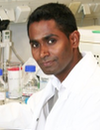
Tuesday, 3 September 201308:00 | Registration | |
Emerging Biomarkers in Cancer |
| | 08:30 |  | Keynote Presentation Detection and Clinical Implications of Circulating Tumor Cells in Cancer Patients
Klaus Pantel, Chairman, Department of Tumor Biology, University Medical Center Hamburg-Eppendorf, Germany
Detection and characterization of CTC opens a new avenue for understanding metastatic spread of tumor cells with important implications for future therapies. Implementation of CTC analyses in clinical trials testing new anti-cancer agents as companion diagnostics will speed up the cumbersome and expensive drug validation process in oncology. |
| 09:30 | Detection and Characterization of Viable Circulating Tumor Cells
Catherine Alix-Panabieres, Associate Professor, University Medical Center of Montpellier, France
The enumeration and characterization of circulating tumor cells (CTCs) in the peripheral blood and disseminated tumor cells (DTCs) in bone marrow may provide important prognostic information and might help to monitor efficacy of therapy. | 10:15 | Coffee Break and Networking in the Exhibition Hall | 10:35 | The Worldwide Market Landscape for Exosomes: Research and Translational Opportunities
Enal Razvi, Managing Director, Select Biosciences Inc, United States of America
SELECTBIO has been tracking the qualitative and quantitative trends and opportunities in the exosomes and microvesicles marketplace. In this presentation, I provide an up-to-date snapshot of this evolving marketplace excerpted from SELECTBIO's various market reports on this topic. Presented are technologies for exosome analysis, segmentation of the exosome research market, market penetrance of various approaches for exosome study, disciplines/disease areas where exosome research is currently being carried out, and sizes of some of the market segments in this space—both from a basic research and a translational standpoint. | 11:20 | Molecular Characterization of Circulating Tumor Cells
Evi Lianidou, Professor, University of Athens, Greece
Circulating Tumor Cell (CTC) analysis is a promising new diagnostic field for cancer patients towards the estimation of risk for metastatic relapse or metastatic progression. Molecular characterization of CTC can provide important information on the molecular and biologic nature of these cells and is very important for the identification of therapeutic targets and resistance mechanisms in CTC, as well as for the stratification of patients and real-time monitoring of systemic therapies. | |
Sequencing in Rapid Disease Diagnosis |
| | 12:05 |  | Keynote Presentation The Promise of Next Generation Sequencing for Infectious Disease Diagnostics
Till Bachmann, Reader, University of Edinburgh, United Kingdom
The adoption of molecular diagnostics of infectious diseases and antibiotic resistance is well on the rise, serving an ever increasing demand for rapid results which can be obtained at the point of care. The advent of next generation sequencing technologies is now set to revolutionise these applications in infectious disease diagnostics, outbreak tracking and personalised medicine. |
| 13:05 |  Technology Spotlight: Technology Spotlight:
Nanoparticle Tracking Analysis – A Novel Technique for Exosomes Research
Thomas Benen, Sales Manager, Microtrac
The technique of Nanoparticle Tracking Analysis from NanoSight Ltd is a recently developed method which is being rapidly adopted for the analysis and counting of exosomes and microvesicles. Based on a unique microscopical laser illumination configuration, this technique allows biological nanoparticles in a sample to be simultaneously but individually visualised, sized (through video analysis of their Brownian motion) and counted in real time and in complex backgrounds. Furthermore, it is capable of detecting and analysing fluorescently labelled exosomes and microvesicles allowing for phenotyping of subpopulations of such structures in clinical samples. The technique will be described and selected examples will be shown from the 250+ papers describing the use of NTA in the routine analysis of biological samples of clinical significance in a wide range of applications concentrating on the use of exosomes and microvesicles in diagnosis and therapeutics.
| 13:20 | Lunch and Networking in Exhibition Hall | 13:35 | Poster Viewing Session | |
Applications of Exosomes in Diagnostics |
| | 14:15 | Towards an Exosomes-based Molecular Test for Remission Monitoring of Cancer
Michiel Pegtel, Associate Professor, Cancer Center Amsterdam, VU University Medical Center, Netherlands
In this presentation Next-Gen sequencing is used to explore the complex small RNAome in exosomes and how this technique maybe useful for future biomarker studies in large patient groups. | 15:00 | Proteomic Analysis of Human Urinary Exosomes in Diabetic Nephropathy, Potential Markers of Disease
Gloria Alvarez-Llamas, Senior Investigator, IIS-Fundacion Jimenez Diaz, Spain
Proteomic analysis of human urinary exosomes revealed specific alterations in diabetic nephropathy and a panel of three candidate markers to be monitored for disease diagnosis and follow-up. | 15:45 |  | Keynote Presentation Role of Exosomes in Neurodegeneration
Lawrence Rajendran, Velux Stiftung Professor for Systems and Cell Biology of Neurodegeneration, University of Zurich, Switzerland
Professor Rajendran will discuss the role of secreted microvesicles and exosomes in neurodegenerative diseases such as Alzheimer's and Parkinsons's disease. |
| 16:30 | Coffee Break and Networking in the Exhibition Hall | |
Cancer Personalised Medicine |
| | 16:50 | Fast-Tracking Molecular Diagnostics in Oncology via Antibody-Based Proteomics and Digital Pathology
William Gallaghr, Chief Scientific Officer/Professor, OncoMark Limited/University College Dublin, Ireland
This presentation will cover the utility of antibody-based profiling using tissue microarrays and associated digital pathology approaches to expedite the transition from biomarker discovery to validation in oncology. Case studies covering a range of cancer and biomarker types will be outlined. | 17:35 | Enrichment of Genomic Fractions for Mutations Prior to Sequencing using COLD-PCR
Mike Makrigiorgos, Professor, Dana-Farber Cancer Institute/Harvard Medical School, United States of America
Rare mutations in clinical samples can have major prognostic and predictive implications, yet they are difficult to detect using sequencing. We present novel enhancements in COLD-PCR technology that enable enrichment of mutations in large genomic fractions prior to high throughput sequencing, thus enabling their detection. | 18:20 | Next Generation Sequencing and its Impact on Clinical Oncology
Robert Loewe, Chief Executive Officer, Genewake, Germany
NextGen sequencing increasingly enters the area of everyday clinical routine. After an overview of the NGS development until today, current and future applications of this technology in the field of oncology, e.g. screening of specific biomarkers, will be demonstrated. | 19:05 | End of Day One |
Wednesday, 4 September 2013 |
Exosomes in Disease |
| | 08:00 | Multiplexed Measurement of Disease Biomarkers by Mass Spectometry (MRM) for Predictive and Prognostic Purposes
Stephen Pennington, Professor, University College Dublin, Ireland
The application of a range of proteomics strategies has resulted in the discovery of very large numbers of potential new protein biomarkers but few have reached clinical utility for (a) understanding the molecular mechanisms of disease pathogenesis, (b) identifying new therapeutic targets, or (c) implementing biomarker based personalised treatment. Some of the challenges faced in the protein biomarker development process and potential solutions will be described from our recent studies on prostate cancer and psoriatic arthritis. In these on-going collaborative projects we are developing a ‘clinical question focused’ pipeline for candidate protein biomarker assembly and validation of 'protein biomarker signatures' by multiple reaction monitoring (MRM). The potential of this approach for the delivery of more personalised patient treatment will be discussed. | 08:45 | Exosomes and Microvesicles in the Circulation
Raymond Schiffelers, Professor of Nanomedicine, University Medical Center Utrecht, Netherlands
Blood cells respond to stress with release of extracellular vesicles. In particular red blood cells are prone to vesicle release upon a range of stress signals which can range from mechanical stress (e.g. during cardiopumonary bypass procedures) or chemical stress after pharmaceutical intervention (e.g. Taxol). These vesicles carry phosphatidylserine which is thrombogeneic, and carry iron/heme which can cause oxidative stress. | 09:30 | Blood and Urinary Vesicles in Health and Disease
Muthuvel Jayachandran, Associate Professor, Mayo Clinic, United States of America
Cells involved in pathophysiological processes shed sealed membranous vesicles called microvesicles and exosomes. The composition and count of vesicles in the blood and urine depend upon their cell of origin and the stimulus that triggers their production. Thus, extracellular vesicles may serve as potential biomarkers for diagnosis, prognosis, and management of ongoing disease processes. | 10:15 | Coffee Break and Networking in the Exhibition Hall | 10:35 | The Role of CTCs in Primary and Metastatic Breast Cancer
Tanja Fehm, Professor, University of Tuebingen, Germany
The detection of circulating tumor cells in the blood (CTCs) is a common phenomenon seen in 10-20% of primary breast cancer patients. Recent studies have shown a prognostic potential of CTC in both primary and metastatic setting. The evaluation of CTC may become one of the crucial markers for prediction of survival and therapy monitoring. | 11:20 | Immune Regulation by Exosomes: Characterization and Optimization for Clinical Applications
Paul Robbins, Professor, Department of Biochemistry, Molecular Biology, and Biophysics, and the Institute on the Biology of Aging and Metabolism, University of Minnesota Medical School, United States of America
Exosomes derived from both exogenous and endogenous antigen presenting cells, including dendritic cells and macrophages, are able to regulate the immune response in an antigen-dependent manner. Similarly, circulating tumor-derived exosomes regulate the immune response to tumor antigens in an antigen-dependent manner. | 12:05 | Exosomes Detection and Speciation by Nanoparticle Tracking Analysis (NTA) – Potential Biomarkers for a Broad Range of Diseases
Thomas Benen, Sales Manager, Microtrac, United Kingdom
Exosomes represent a new and ubiquitous class of interacellular signalling structure and as such can be used as diagnostic structures. NanoParticle Tracking Analysis uniquely allows for their visualisation, sizing and counting and, through the use of fluorescent labels, their phenotyping.
| 12:45 | Lunch and Networking in Exhibition Hall | 13:15 | Poster Viewing Session | |
Companion Diagnostics |
| | 13:45 | Luminescent Nanoparticles in Medical Diagnostics
Sofia Dembski, Researcher, Fraunhofer Institute for Silicate Research, Germany
We present an update on our activities in the fabrication and surface functionalization of luminescent nanoparticles for applications in medical diagnostics. Continued investigations of our novel nanoparticles further support their great application potential in the field of biological and medical diagnostics. | |
Data Analysis and Bioinformatics |
| | 14:30 |  | Keynote Presentation Evolutionary Lessons and Solutions for Genomic Medicine
Sudhir Kumar, Professor, Arizona State University, United States of America
For billions of years, mutations in genomes have been subjected to the process of natural selection, which have left evolutionary imprints in our genomes. I will discuss insights from our investigations aimed at understanding and predicting genotype-phenotype relationships through an analysis of human genome variation implicated in Mendelian, cancer, and other complex diseases. |
| 15:30 | Coffee Break and Networking in the Exhibition Hall | |
Applications of Sequencing Data |
| | 15:50 | Effects of Nickel and Hypoxia on Histone Methylation and Gene Expression: From Cultured Cells to Human Population Study
Hong Sun, Assistant Professor , NYU School of Medicine , United States of America
The genome-wide changes of histone methylation and gene expression were analyzed in human lung cells following Nickel and Hypoxia exposure. The study of histone modification in human peripheral blood mononuclear cells indicates an association between the occupational nickel exposure and the alteration of histone modification. | |
Emerging Technologies in MDx and CDx |
| | 16:35 | The Next Generation of NGS; What's Missing and What's Next
Jonathan O'Halloran, Chief Scientific Officer/Co Founder, QuantuMDx Group Ltd, United Kingdom
The DNA sequencing field has seen dramatic advances since the first draft of the human genome was published, with companies reporting ever faster and cheaper methods. However, despite the race to attain the $1000 genome producing a plethora of exciting technologies, CE is still being routinely used for targeted clinical sequencing for genetic testing and drug resistance testing for infectious disease. QuantuMDx is developing two sequencing technologies to address this; a portable, handheld DNA sequencing device for PGx and infectious disease applications, to provide an alternative to slow and relatively expensive CE DNA sequencing and a "LastGen 2.0" technology to take on Nanopore sequencing head on, dubbed, T2T (Telomere to Telomere). | 17:20 | Close of Conference |
|

 Add to Calendar ▼2013-09-03 00:00:002013-09-04 00:00:00Europe/LondonMolecular Medicine CongressMolecular Medicine Congress in Frankfurt, GermanyFrankfurt, GermanySELECTBIOenquiries@selectbiosciences.com
Add to Calendar ▼2013-09-03 00:00:002013-09-04 00:00:00Europe/LondonMolecular Medicine CongressMolecular Medicine Congress in Frankfurt, GermanyFrankfurt, GermanySELECTBIOenquiries@selectbiosciences.com